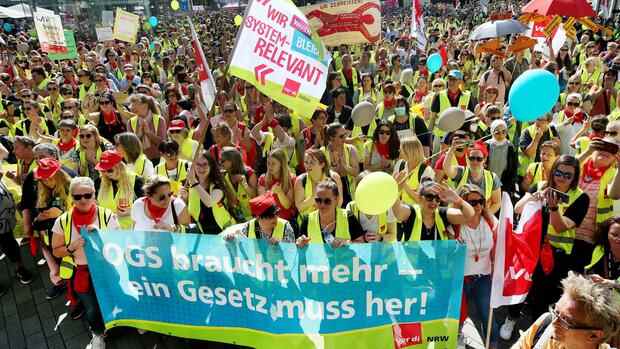The municipal employers rule out a flat-rate financial revaluation of the social and educational professions.
(Photo: dpa)
Berlin Most recently, the Verdi union in Gelsenkirchen put pressure on. For weeks, employees in social and educational services have been taking to the streets nationwide to campaign for the upgrading of their profession and to build up pressure in the ongoing wage negotiations. They go into the third and possibly decisive round on Monday.
This week, 45,000 social and education workers have taken part in strikes. The daycare centers are at the limit nationwide, said union boss Frank Werneke in front of around 10,000 educators, social workers and helpers for the disabled. “There’s pressure on the boiler.”
It is no coincidence that Verdi chose Gelsenkirchen of all places for the mass rally on Wednesday. Karin Welge is the mayor here and, as President of the Association of Municipal Employers’ Associations (VKA), leads the negotiations on the employers’ side.
>> Read here: How employers and unions agreed in the last wage round for the federal and local governments
Top jobs of the day
Find the best jobs now and
be notified by email.
She has little understanding for the work stoppages of the past few days: “In my view, the current strikes are inappropriate because we are still within the agreed schedule of the negotiations. We are willing and confident that we can reach a consensus in the third round of negotiations.” The previous two rounds had not resulted in a breakthrough.
The negotiations are about 330,000 municipal employees. This is not a classic pay round – wage percentages will not be negotiated until the beginning of next year in the general collective bargaining round for federal and local employees.
What the unions want
Above all, the trade unions – in addition to Verdi, the DBB civil servants’ association and collective bargaining union – want to achieve that employees are classified higher in the pay tables and thus better paid for their work. They are also demanding a relief package that includes, among other things, additional days off. In this way, social and educational professions should become more attractive and the shortage of skilled workers should be solved.
Employers rule out a blanket upgrade for all employees in social and educational services: “We have to take a close look at where the requirements have increased and how we can counteract this,” emphasizes Welge. For example, with the new Child and Youth Strengthening Act, the employees of child and youth welfare have faced new tasks.
Social and educational services are already recording disproportionate wage increases
Welge put the financial volume of the unions’ demands for classification alone at 500 million euros. In view of the number of only 330,000 employees at stake, this is an enormous burden.
The required relief package, on the other hand, cannot be quantified, but would mean a lot of bureaucracy. “And it doesn’t help anyone if numerous days off are also introduced, which then ensure that even fewer staff can work in the facilities.”
Verdi calculates that a nanny with state recognition would earn a good 3,050 euros a month after the desired higher classification – almost 174 euros or six percent more than currently. At the top, according to the VKA, the union demands would mean up to 330 euros more per month.
Unions want to make daycare work more attractive.
(Photo: dpa)
However, this is not justifiable because the social and educational service is already benefiting disproportionately from pay increases thanks to two upgrade rounds in 2009 and 2015. The collective wages of federal and local employees have risen by 31 percent since 2015.
According to the VKA, remuneration in social and educational services increased by 61 percent in the same period, almost twice as much. The trade unions argue that the sharp rise in prices also means higher tax revenues for the municipalities, so that there is a larger distribution pool.
Welge counters with the argument that the rising prices would primarily affect low-income groups and that this will be reflected in social spending, which in turn will burden municipal budgets.
Unions plan more strikes
If the third round of negotiations, which takes place on Monday and Tuesday in Potsdam and Berlin, does not bring about a breakthrough, then the trade unions are threatening to intensify the industrial dispute.
The civil servants’ association published the results of a Forsa survey on Friday, according to which 87 percent of citizens consider the demand for better pay, for example through a higher classification in the corresponding pay tables, to be justified. Employees’ demands for time relief also received clear support at 81 percent.
“What the colleagues experience every day, namely a great deal of solidarity from those affected, is confirmed by the results of this representative survey,” said Ulrich Silberbach, head of the civil service association.
More on this: Telekom employees will receive more money from August
